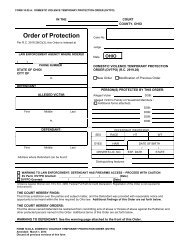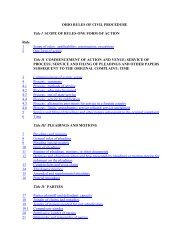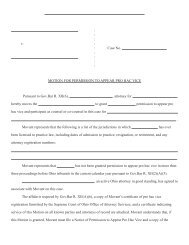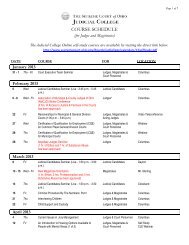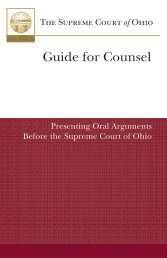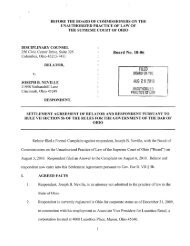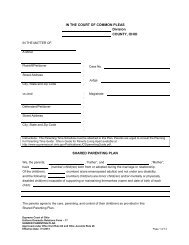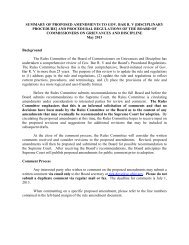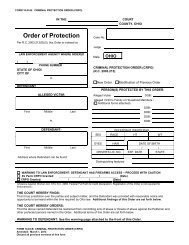- Page 1:
The Supreme Court of OhioBoard of C
- Page 5 and 6:
Drain, Cuyahoga Cty. Bar Assn. v.12
- Page 7 and 8:
Horton, Disciplinary Counsel v.124
- Page 9 and 10:
Markovich, Akron Bar Assn. v.117 Oh
- Page 11 and 12:
Table of Cases- 9Ramos, Cleveland B
- Page 13 and 14:
Table of Cases- 11Stuard, Becker, B
- Page 15 and 16:
Case SummariesAllerding, Columbus B
- Page 17 and 18:
Case Summaries- 15Archer, Northwest
- Page 19 and 20:
Case Summaries- 17intermittently ov
- Page 21 and 22:
Bartels, Allen Cty. Bar Assn. v.124
- Page 23 and 24:
Blair, Disciplinary Counsel v.128 O
- Page 25 and 26:
Case Summaries- 23Bowling, Discipli
- Page 27 and 28:
Broschak, Disciplinary Counsel v.11
- Page 29 and 30:
Brown, Dayton Bar Assn. v.124 Ohio
- Page 31 and 32:
Brown, Allen Cty. Bar Assn. v.124 O
- Page 33 and 34:
Brueggeman, Disciplinary Counsel v.
- Page 35 and 36:
Bunstine, Disciplinary Counsel v.12
- Page 37 and 38:
Bursey, Disciplinary Counsel v.124
- Page 39 and 40:
Butler, Disciplinary Counsel v.128
- Page 41 and 42:
Campbell, Disciplinary Counsel v.12
- Page 43 and 44:
Cantrell, Disciplinary Counsel v.12
- Page 45 and 46:
Cantrell, Disciplinary Counsel v.13
- Page 47 and 48:
Case Summaries- 45abuse impede his
- Page 49 and 50:
Case Summaries- 47respondent‘s de
- Page 51 and 52: Case Summaries- 49with a client if
- Page 53 and 54: Case Summaries- 51not DR 1-102(A)(5
- Page 55 and 56: Clovis, Columbus Bar Assn. v.125 Oh
- Page 57 and 58: Corrigan, Geauga Cty. Bar Assn. v.1
- Page 59 and 60: Cunningham, Butler Cty. Bar Assn. v
- Page 61 and 62: Davis, Disciplinary Counsel v.121 O
- Page 63 and 64: Dawson, Cleveland Metropolitan Bar
- Page 65 and 66: DeLoach, Akron Bar Assn. v.130 Ohio
- Page 67 and 68: Detweiler, Disciplinary Counsel v.1
- Page 69 and 70: DiCato, Akron Bar Assn. v.130 Ohio
- Page 71 and 72: DiMartino, Mahoning Cty. Bar Assn.
- Page 73 and 74: Doellman, Disciplinary Counsel v.12
- Page 75 and 76: Drain, Cuyahoga Cty. Bar Assn. v.12
- Page 77 and 78: Ellis, Columbus Bar Assn. v.120 Ohi
- Page 79 and 80: Emerson, Cincinnati Bar Assn. v.122
- Page 81 and 82: Farah, Toledo Bar Assn. v.125 Ohio
- Page 83 and 84: Farrell, Cincinnati Bar Assn. v.129
- Page 85 and 86: Fink, Akron Bar Assn. v.131 Ohio St
- Page 87 and 88: Folwell, Disciplinary Counsel v.129
- Page 89 and 90: Freedman, Akron Bar Assn. v.128 Ohi
- Page 91 and 92: Freeman, Disciplinary Counsel v.126
- Page 93 and 94: Freeman, Disciplinary Counsel v.119
- Page 95 and 96: Frost, Disciplinary Counsel v.122 O
- Page 97 and 98: Case Summaries- 95his goal of gaini
- Page 99 and 100: Gibson, Akron Bar Assn. v.128 Ohio
- Page 101: Glaeser, Cuyahoga Cty. Bar Assn. v.
- Page 105 and 106: Gottehrer, Cleveland Metro. Bar Ass
- Page 107 and 108: Case Summaries- 105disgorgement of
- Page 109 and 110: Grote, Cincinnati Bar Assn. v.127 O
- Page 111 and 112: Hackett, Cincinnati Bar Assn. v.129
- Page 113 and 114: Case Summaries- 111presented eviden
- Page 115 and 116: Hanni, Mahoning Cty. Bar Assn. v.12
- Page 117 and 118: Hauck, Cincinnati Bar Assn. v.129 O
- Page 119 and 120: Heiland, Disciplinary Counsel v.116
- Page 121 and 122: Heisler, Cincinnati Bar Assn. v.119
- Page 123 and 124: Henry, Disciplinary Counsel v.127 O
- Page 125 and 126: Hickman, Toledo Bar Assn. v.119 Ohi
- Page 127 and 128: Hildebrand, Cleveland Metro. Bar As
- Page 129 and 130: Holda, Akron Bar Assn. v.125 Ohio S
- Page 131 and 132: Horan, Disciplinary Counsel v.123 O
- Page 133 and 134: Hoskins, Disciplinary Counsel v.119
- Page 135 and 136: Howard, Disciplinary Counsel v.123
- Page 137 and 138: Hunter, Columbus Bar Assn. v.130 Oh
- Page 139 and 140: Jackel, Ohio State Bar Assn. v.118
- Page 141 and 142: Jackson, Disciplinary Counsel v.127
- Page 143 and 144: Jaffe, Cleveland Metro Bar Assn. v.
- Page 145 and 146: Johnson, Toledo Bar Assn. v.121 Ohi
- Page 147 and 148: Johnson, Cuyahoga Cty. Bar Assn. v.
- Page 149 and 150: Johnston, Disciplinary Counsel v.12
- Page 151 and 152: Jones, Mahoning Cty. Bar Assn. v.12
- Page 153 and 154:
Kaplan, Cleveland Metro. Bar Assn.
- Page 155 and 156:
Kealy, Cleveland Metro. Bar Assn. v
- Page 157 and 158:
Kellogg-Martin, Disciplinary Counse
- Page 159 and 160:
Kelly, Disciplinary Counsel. v.121
- Page 161 and 162:
Case Summaries- 159other assets in
- Page 163 and 164:
Case Summaries- 161none of the mone
- Page 165 and 166:
Case Summaries- 163Although the uns
- Page 167 and 168:
Kubyn, Lake Cty. Bar Assn. v.121 Oh
- Page 169 and 170:
Landis, Disciplinary Counsel v.124
- Page 171 and 172:
Lapine, Disciplinary Counsel v.128
- Page 173 and 174:
Larkin, Columbus Bar Assn. v.128 Oh
- Page 175 and 176:
Case Summaries- 173Board‘s findin
- Page 177 and 178:
Lawson, Cincinnati Bar Assn. v.119
- Page 179 and 180:
Lawson, Cincinnati Bar Assn. v.130
- Page 181 and 182:
Lentes, Disciplinary Counsel v.120
- Page 183 and 184:
Lewis, Medina Cty. Bar Assn. v.121
- Page 185 and 186:
Case Summaries- 183and blame the wo
- Page 187 and 188:
Longino, Disciplinary Counsel v.128
- Page 189 and 190:
Lowden, Toledo Bar Assn. v.117 Ohio
- Page 191 and 192:
Case Summaries- 1898.4(h) by his ac
- Page 193 and 194:
Mamich, Disciplinary Counsel v.125
- Page 195 and 196:
Manning, Disciplinary Counsel v.119
- Page 197 and 198:
Marosan, Stark Cty. Bar Assn. v.119
- Page 199 and 200:
Martin, Toledo Bar Assn. v.131 Ohio
- Page 201 and 202:
Mason, Toledo Bar Assn. v.118 Ohio
- Page 203 and 204:
McAuliffe, Disciplinary Counsel v.1
- Page 205 and 206:
McCord, Disciplinary Counsel v.121
- Page 207 and 208:
McFaul, Cleveland Metro. Bar Assn.
- Page 209 and 210:
Case Summaries- 207withdrawal. Resp
- Page 211 and 212:
Case Summaries- 209that he is compe
- Page 213 and 214:
Meade, Disciplinary Counsel v.127 O
- Page 215 and 216:
Miller, Disciplinary Counsel v.126
- Page 217 and 218:
Minamyer, Butler Cty. Bar Assn. v.1
- Page 219 and 220:
Case Summaries- 217represent his cl
- Page 221 and 222:
Case Summaries- 219became effective
- Page 223 and 224:
Mitchell, Disciplinary Counsel v.12
- Page 225 and 226:
Mullaney, Brooking, and Moeves, Cin
- Page 227 and 228:
Murraine, Disciplinary Counsel v.13
- Page 229 and 230:
Nance, Cleveland Metropolitan Bar A
- Page 231 and 232:
Newcomer, Disciplinary Counsel v.11
- Page 233 and 234:
Newman, Cincinnati Bar Assn. v.124
- Page 235 and 236:
Niermeyer, Disciplinary Counsel v.1
- Page 237 and 238:
Nittskoff, Disciplinary Counsel. v.
- Page 239 and 240:
Case Summaries- 237Master Commissio
- Page 241 and 242:
Ohlin, Disciplinary Counsel v.126 O
- Page 243 and 244:
O’Malley, Disciplinary Counsel v.
- Page 245 and 246:
Case Summaries- 243conditions that
- Page 247 and 248:
Patterson, Geauga Cty. Bar Assn. v.
- Page 249 and 250:
Peskin, Ohio State Bar Assn. v.125
- Page 251 and 252:
Case Summaries- 249met by imposing
- Page 253 and 254:
Plough, Disciplinary Counsel v.126
- Page 255 and 256:
Podor, Cleveland Metro. Bar Assn. v
- Page 257 and 258:
Portman, Butler Cty. Bar Assn. v.12
- Page 259 and 260:
Potter, Disciplinary Counsel v.126
- Page 261 and 262:
Pullins, Disciplinary Counsel v.127
- Page 263 and 264:
Case Summaries- 261disqualification
- Page 265 and 266:
Randall, Dayton Bar Assn. v.118 Ohi
- Page 267 and 268:
Case Summaries- 265history, no dish
- Page 269 and 270:
Raso, Disciplinary Counsel v.129 Oh
- Page 271 and 272:
Resnick, Ohio State Bar Assn. v.128
- Page 273 and 274:
Ricketts, Disciplinary Counsel v.12
- Page 275 and 276:
Ridenbaugh, Disciplinary Counsel v.
- Page 277 and 278:
Ritson, Toledo Bar Assn. v.127 Ohio
- Page 279 and 280:
Roberts, Disciplinary Counsel v.117
- Page 281 and 282:
Robinson, Disciplinary Counsel v.12
- Page 283 and 284:
Rohrer, Disciplinary Counsel v.124
- Page 285 and 286:
Rozanc, Lake Cty. Bar Assn. v.123 O
- Page 287 and 288:
Rust, Toledo Bar Assn. v.124 Ohio S
- Page 289 and 290:
Sabol, Disciplinary Counsel v.118 O
- Page 291 and 292:
Case Summaries- 289condition of the
- Page 293 and 294:
Sanz, Cincinnati Bar Assn. v.128 Oh
- Page 295 and 296:
Saunders, Greene Cty. Bar Assn. v.1
- Page 297 and 298:
Sayler, Cleveland Metro. Bar Assn.
- Page 299 and 300:
Case Summaries- 2971.5(a), 1.16(d),
- Page 301 and 302:
Schram, Dayton Bar Assn. v.122 Ohio
- Page 303 and 304:
Scott, Toledo Bar Assn. v.129 Ohio
- Page 305 and 306:
Shaw, Disciplinary Counsel v.126 Oh
- Page 307 and 308:
Shea, Columbus Bar Assn. v.117 Ohio
- Page 309 and 310:
Shuler, Disciplinary Counsel v.129
- Page 311 and 312:
Siewert, Disciplinary Counsel. v.13
- Page 313 and 314:
Simon, Disciplinary Counsel v.128 O
- Page 315 and 316:
Smith, Disciplinary Counsel v.124 O
- Page 317 and 318:
Smith, Disciplinary Counsel v.128 O
- Page 319 and 320:
Smithern, Akron Bar Assn. v.125 Ohi
- Page 321 and 322:
Squire, Disciplinary Counsel v.130
- Page 323 and 324:
Stafford, Disciplinary Counsel v.12
- Page 325 and 326:
Stoll, Erie-Huron Grievance Commt.
- Page 327 and 328:
Stuard, Becker, and Bailey, Discipl
- Page 329 and 330:
Taylor, Disciplinary Counsel v.120
- Page 331 and 332:
Theisler, Mahoning Cty. Bar Assn. v
- Page 333 and 334:
Thomas, Cleveland Metro. Bar Assn.
- Page 335 and 336:
Case Summaries- 333court entered an
- Page 337 and 338:
Trainor, Cincinnati Bar Assn. v.129
- Page 339 and 340:
Troxell, Columbus Bar Assn. v.129 O
- Page 341 and 342:
Troy, Lake Cty. Bar Assn. v.130 Ohi
- Page 343 and 344:
Case Summaries- 341professionals in
- Page 345 and 346:
Vivyan, Disciplinary Counsel v.125
- Page 347 and 348:
Case Summaries- 345offenses, there
- Page 349 and 350:
Walker, Disciplinary Counsel v.119
- Page 351 and 352:
Weisberg, Toledo Bar Assn. v.124 Oh
- Page 353 and 354:
Case Summaries- 351Chandlers to dis
- Page 355 and 356:
Williams, Disciplinary Counsel v.13
- Page 357 and 358:
Williamson, Butler Cty. Bar Assn. v
- Page 359 and 360:
Wineman, Disciplinary Counsel v.121
- Page 361 and 362:
Wittbrod, Akron Bar Assn. v.130 Ohi
- Page 363 and 364:
Yeager, Disciplinary Counsel v.123
- Page 365 and 366:
Zaffiro, Cleveland Metro. Bar Assn.
- Page 367 and 368:
Zigan, Disciplinary Counsel v.118 O
- Page 369 and 370:
Bennett (2/4/2010) (unlawfullystruc
- Page 371 and 372:
Clovis (5/5/2010) (as required by G
- Page 373 and 374:
on inactive status and while under
- Page 375 and 376:
suspension, and remanded to board t
- Page 377 and 378:
violations for attempt to dismiss a
- Page 379 and 380:
Wineman (5/6/2009)Wolanin (4/1/2009
- Page 381 and 382:
Willette (3/20/2008)DR 2-103(C) (re
- Page 383 and 384:
Patterson (12/2/2009)Ryan (8/27/200
- Page 385 and 386:
DR 7-102(A)(5) (knowingly making fa
- Page 387 and 388:
DR 9-102(B)(4) (failure to promptly
- Page 389 and 390:
Dearfield (10/19/2011)DeLoach (8/31
- Page 391 and 392:
McNerney (5/28/2009)(term suspensio
- Page 393 and 394:
Hoppel (6/8/2011)Hunter (11/15/2011
- Page 395 and 396:
Rule 1.5(a) (charging or collecting
- Page 397 and 398:
Gottehrer (3/17/2010)Gresley (12/22
- Page 399 and 400:
Marshall (2/12/2009)Martin (12/15/2
- Page 401 and 402:
Meade (12/22/2010)Medley (1/27/2011



